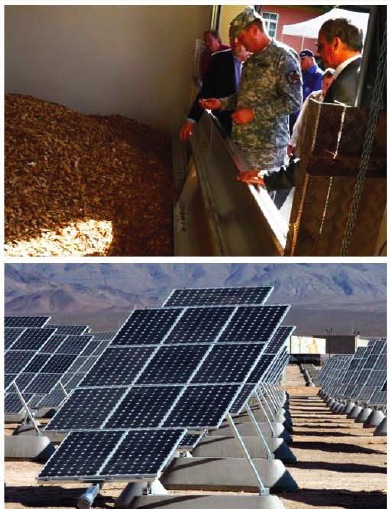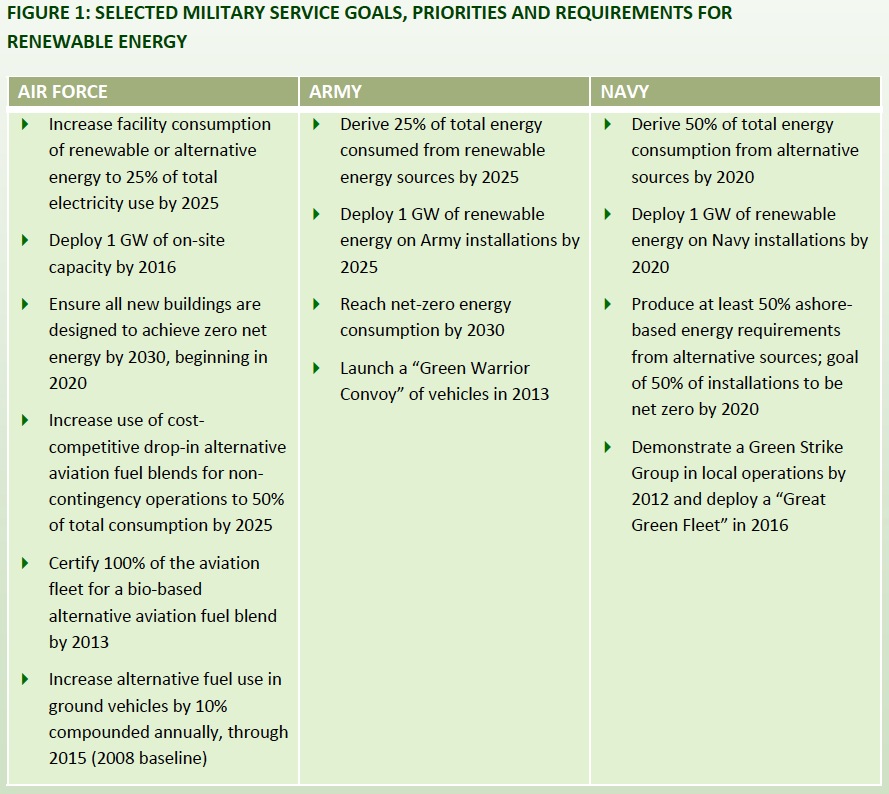AMERICAN COUNCIL ON RENEWABLE ENERGY
 SETTING THE SCENE :RENEWABLE ENERGY FOR NATIONAL SECURITY
SETTING THE SCENE :RENEWABLE ENERGY FOR NATIONAL SECURITY
As the single largest consumer of energy in the U.S., the Department of Defense (DoD) has embarked on an ambitious program of expanded renewable energy generation on bases and in the field, with a goal of producing 25% of its energy from renewable sources by 2025.
Renewable energy is not just a “policy objective” for the armed forces, but also an “operational imperative.” The deployable and decentralized energy production possibilities offered by renewable sources, and by enabling technologies like microgrids, have tremendous implications for the safety, security, and effectiveness of the military. Renewable energy and efficiency improvements can increase warfighter capability, enhance the energy security of its installations, and cut operational and military base energy costs.
MILITARY FACILITY ENERGY USE
Twenty‐percent of the U.S. military’s energy consumption occurs at its installations. DoD pays around $4 billion annually to provide power to its 300,000 plus facilities in the U.S. and around the world. DoD has made improvements in installation energy systems and management a priority, driven by the desire to provide maximum mission support through improved security of supply and reduced costs.
DoD is uniquely positioned to serve as a platform to develop and install new technologies. The Army, Navy, and Air Force are each implementing detailed plans to achieve ambitious renewable energy and energy efficiency targets at military installations (Figure 1). These plans include a one gigawatt (GW) per service target of renewable power capacity at military facilities, primarily via third‐party financing.
PURPOSE OF THIS REPORT
There are several lessons to be learned from the private sector as DoD becomes an increasingly significant player in the renewable energy industry. This report contains a series of industry perspectives about the business considerations associated with renewable energy installations at military facilities, including:
- Policy: State regulatory hurdles for military use of renewables, and best practices in collaboration with state energy offices
- Contracting and Financing: An overview of the existing procurement landscape with insight and recommendations about creating financeable third‐party‐owned projects
- Siting and Technology: Siting effective renewable energy projects at military bases and making use of innovative technology options
- Energy Security and Microgrids: The importance of energy‐secure technologies, like microgrids, to enhance the use of renewable energy at military installations and ensure reliable power for critical infrastructure
The report is intended to be a resource for the Department of Defense and military service officials as they design and amend renewable energy programs, for renewable energy companies and investors as they navigate the military’s procurement processes, and for other interested parties.
A group of prominent renewable energy developers, energy service companies, financiers, law firms, and other groups working with the military authored the twelve articles in this report. The articles generally provide insight about present business opportunities for third‐party‐owned renewable electricity projects at military installations. It should be noted that the military employs renewable energy through a number of diverse applications that continue to expand, and this report does not attempt to give a comprehensive overview of every renewable energy technology or procurement option available.
Renewable Energy for Military Installations: 2014 Industry Review is a product of the American Council On Renewable Energy’s (ACORE’s) National Defense and Security Initiative, which defines the opportunities for the expanded use of renewable energy in support of national defense by drawing on the collective expertise and experience of ACORE members: renewable energy leaders involved in manufacturing, project development, finance, end use, and professional services.
The views and opinions expressed in this report are those of the authors and do not necessarily reflect the views of ACORE.
Download full version (PDF): Renewable Energy for Military Installations
About the American Council on Renewable Energy
www.acore.org
ACORE, a 501(c)(3) non-profit membership organization, is dedicated to building a secure and prosperous America with clean, renewable energy. ACORE provides a common educational platform for a wide range of interests in the renewable energy community, focusing on technology, finance and policy. We convene thought leadership forums and create energy industry partnerships to communicate the economic, security and environmental benefits of renewable energy.
Tags: ACORE, American Council on Renewable Energy, military, National Security







 RSS Feed
RSS Feed